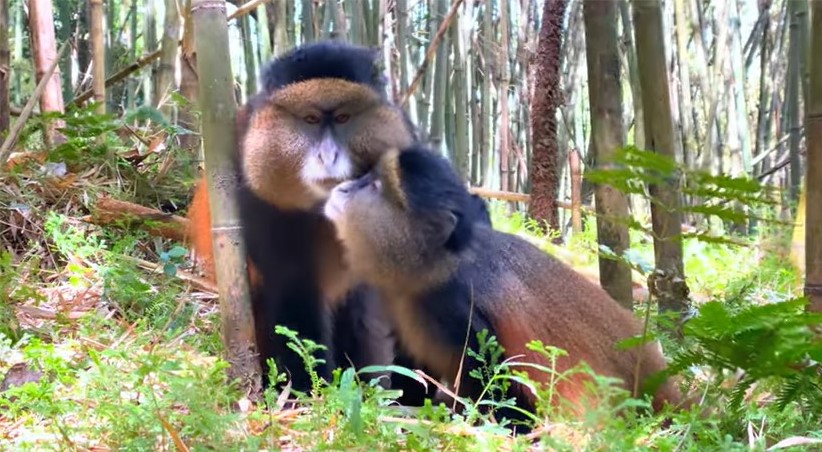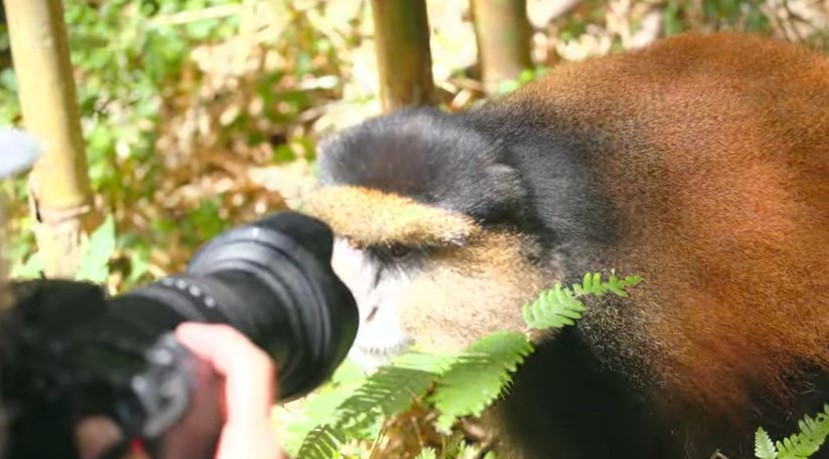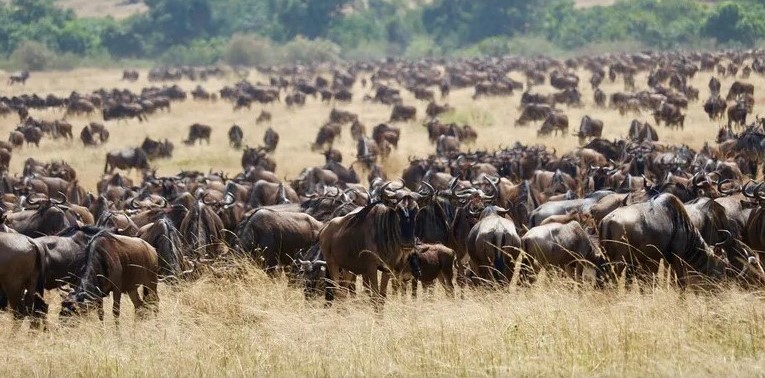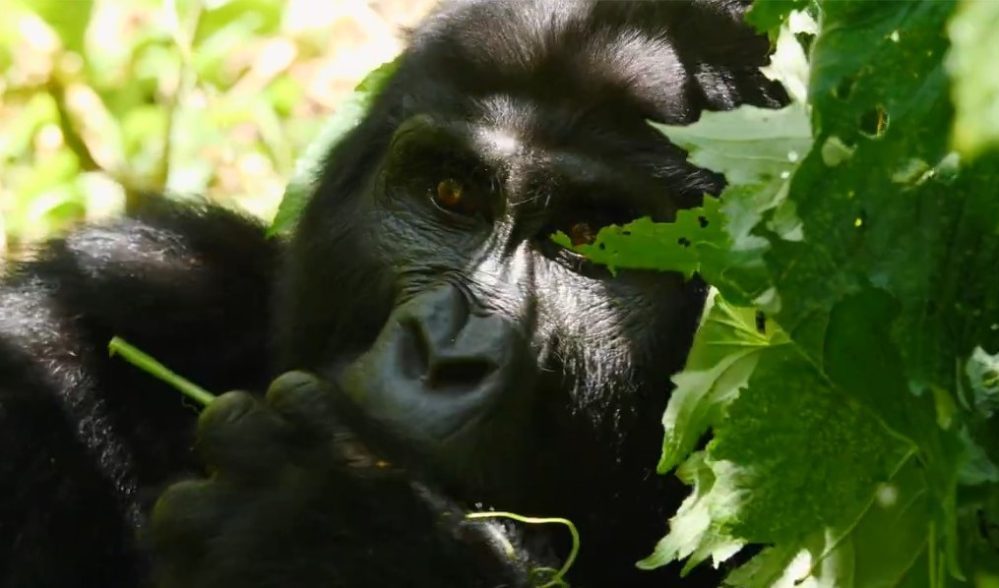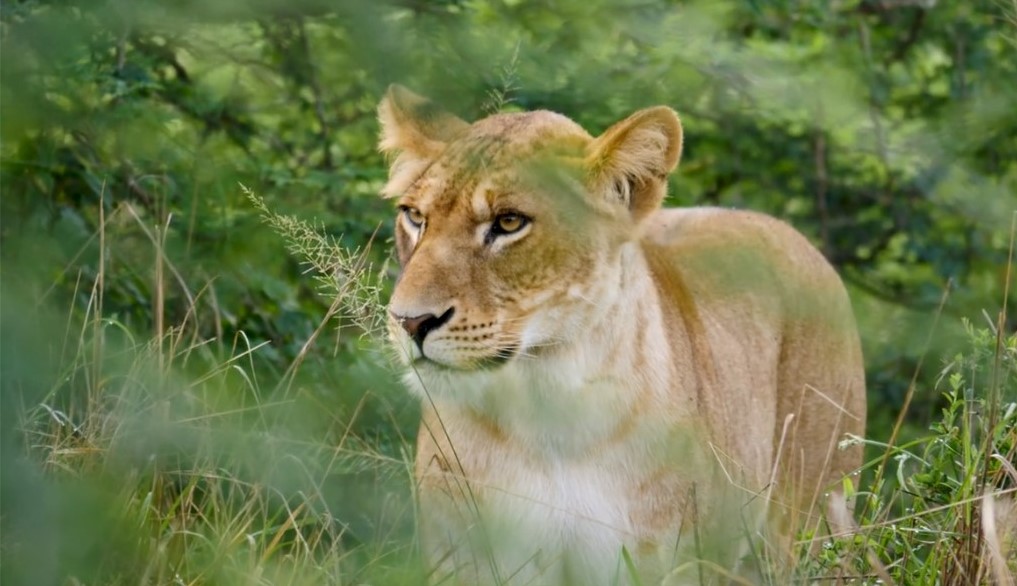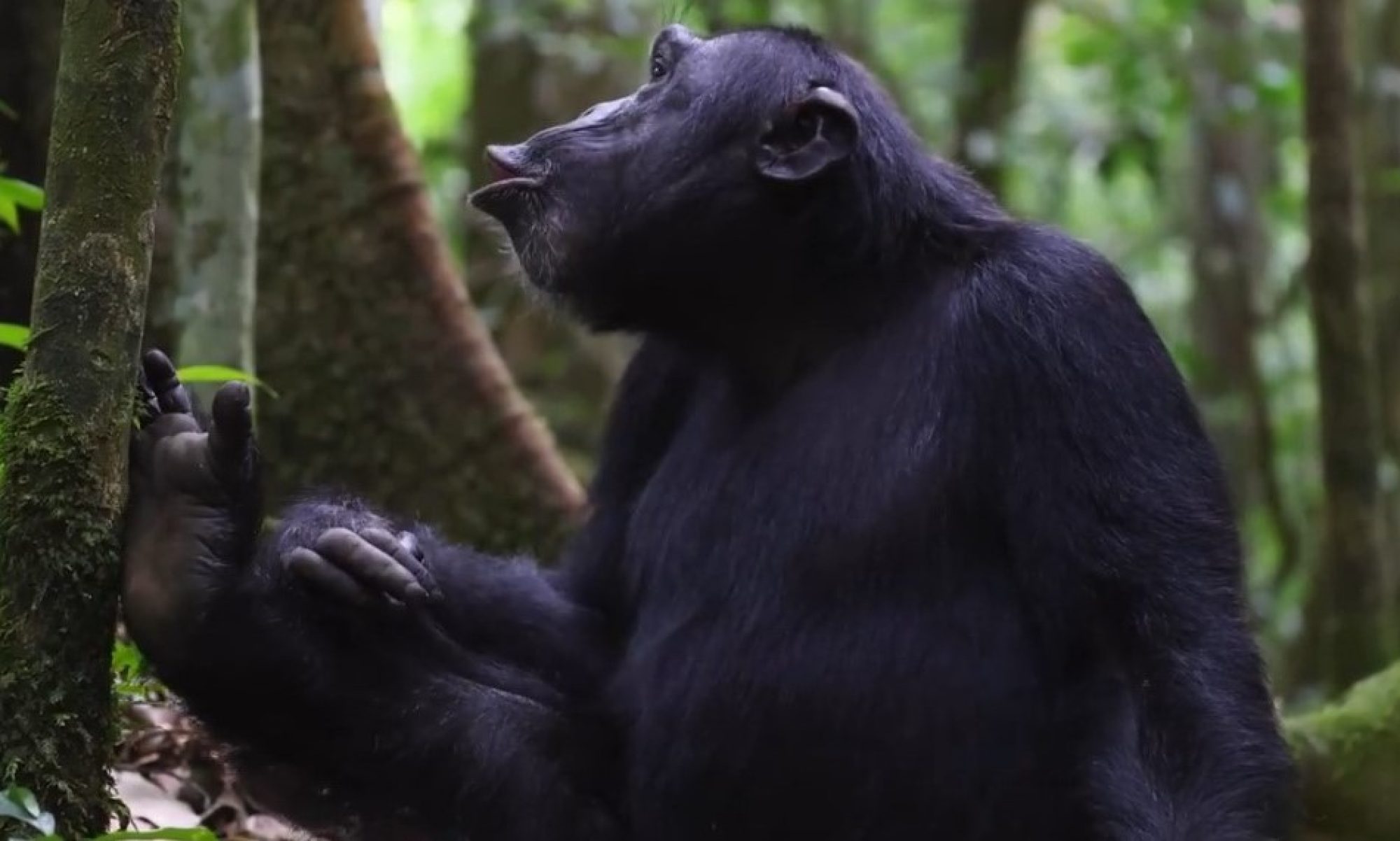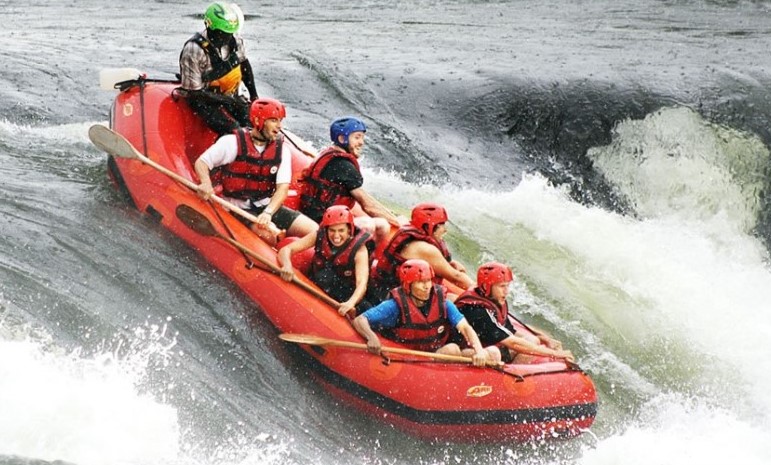Gorillas and Primates safaris
Gorilla trekking expeditions
There are only 3 destinations in the world where you can find the endangered mountain gorillas. There are currently about 1,064 mountain gorillas in these countries living in two separate locations. One group lives in the Virunga mountains which are shared amongst the 3 countries; Rwanda at Volcanoes national park, DR Congo at Virunga national park and Uganda at Mgahinga national park and the other group resides in the Bwindi Impenetrable national park in Uganda. Travelers on a gorilla safari have 100% chances to meet face to face with the endangered mountain gorillas a species that share 98% DNA nearest to that of humans. Nowhere else in the world do these endangered reside in a natural habitat and because of this, thousands of travelers visit for gorilla trekking experiences to have the best lasting memories. Gorillas are gentle and the trekked groups have been habituated for a long time that are used to human visits. The list of food items is long: fruits, roots, nuts, leaves, plants, flowers, insects, meat among others. In the wild, meat makes up less than 2% of their diet.
Gorilla habituation
For habituation to be, wild gorilla families are tracked by rangers for a period of time to make them get used to the presence of human. It’s after such a process that these gorilla families are then opened up to tourism. Gorilla habituation is thus a great process that facilitates gorilla trekking as it helps influence the behavior of gorillas for the to get used to human presence.
Best seasons for gorilla trekking safaris
The dry seasons in these areas are the best for the gorilla trekking experiences that is from June to September and December to March. It’s easier to trek to the higher altitudes where gorillas stay during dry seasons when there’s rainfall that makes the terrain slippery and muddy thus making it difficult to achieve to gorilla nests easily. Also gorillas like any other animals tend to roam more during the dry season creating higher chances of finding them easier than during the wet seasons.
Gorilla permits
Gorilla permits or pass are the most crucial requirement for trekking mountain gorilla in all these countries. Gorilla permits can be bought through a trusted tour agent like Travitude safari tours company at least months in advance prior to the date of visit. The number of trekkers is limited per gorilla family per day so for surety of a gorilla trekking trip advance booking is needed.
Habituation is only done at Bwindi impenetrable national park giving an opportunity to visitors 4 hours per day with the Gorillas at a charge of $1,500 (tourists), $1,000 (foreign residents) and 750,000 UGSHS for East African nationals.
A gorilla trekking permit in Uganda costs $800 for tourists (FNR- foreign nationals/residents), $700 for foreign residents (FR), $500 for individuals from the rest of Africa, Ugshs. 300,000 for East African residents.
A gorilla permit in Rwanda costs $1500 for foreign nationals, $500 for foreign residents in Rwanda, rest of Africa and African nationals and $200 for East African residents and Rwandan citizens.
What next after finding the gorillas.
As soon as you locate these mountain gorillas, you will be allowed to stay with them for over an hour as you are having photos, observing, asking questions and so on. However, during this session, you are not allowed to eat anything, drink, and take photos when the flash lights are on.
You are not allowed to get too close to the gorillas and also advised to wear a mask if you’ve got one a regulation aimed at protecting the primates from catching viral or bacterial respiratory diseases like flue or cold.
When the one hour of staying around a particular gorilla family elapses, you are asked to get back to the lodge and leave the jungle for the gorillas.
Gorilla trekking in Rwanda Vs Uganda
Gorilla trekking safaris offer unique experiences to each traveler that embarks on them from any of these countries. Rwanda is more of a high end destination given its high cost accommodation facilities which makes a primates trip to Rwanda costlier that in Uganda. In terms of cost, Rwanda is the priciest with its trekking permit at $1,500 per person while the same going for $800 per person in Uganda for foreign residents, $700 for foreign residents and UGSHS 300,000 for East African residents.
In terms of distance;
It will take 10 hours to drive from Entebbe international airport to Bwindi impenetrable national park in Uganda; with another option to use Kigali international airport from Rwanda taking 4 hours only. And only 3 hours to drive from Kigali international airport to the Volcanoes national park in the northwest of the country. Both countries are relatively doing well in terms of security and higher priority is given their tourism sectors.
Gorilla trekking safari rules and preparation tips;
- Tropical countries have unpredictable climate, rain gear is a must have
- Insect repellent
- Recommended clothing – long trousers and long sleeved sweaters or shirts while in the forest to avoid insect and plant stings.
- Sturdy hiking boots are essential, especially ones you have used before.
- Drinking water, however eating, drinking and smoking near the gorillas is strictly forbidden – your guide will communicate designated time and place.
- Photography is permitted, although you must not use flash
- Porters are available to help you carry your day-pack for a small charge.
- You will not be allowed to trek gorillas if you have communicable disease like flu or cough
Chimpanzee tracking safaris
Chimpanzees alongside gorillas as the only great apes of Africa and there are 3 major chimp trekking destinations in Uganda; Kibale forest national park, Murchison falls national park and Elizabeth national park. Kibale forest is the best place for chimp tracking as the forest has the highest concentration and sightings for chimpanzees. The forest is a home to more than 1,500 chimpanzees with up to 90% chances of sightings. The rainforest is easily accessible from Kampala by road or Entebbe by flight. The tracking expeditions are conducted twice a day at 8:00 am and 14:00 pm. Kibale national park is well positioned making combining chimpanzee trekking with other activities like game drives both at Queen Elizabeth national park and Murchison falls national park, birding and geothermal hot springs at Semuliki national park, Mountain Rwenzori national park treks and expeditions easily possible while touring the same route.
Other places that can give a great experience watching wild chimps include Mahale Mountains and Gombe Stream in Tanzania, and Nyungwe Forest in Rwanda. Mahale Mountains National Park is larger, tougher primate wilderness for a Tanzania chimpanzee trekking safari. It shelters more than 800 chimpanzees and many other primates. Only one group, are habituated to humans while the rest are wildly skittish. Chimpanzees are omnivorous frugivorous. That means in the wild they eat all sorts of produce as well as some animals but are particularly fond of fruits. The list of food items is long: fruits, roots, nuts, leaves, plants, flowers, insects, meat among others. In the wild, meat makes up less than 2% of their diet.
Chimpanzee Habituation
With chimpanzee habituation you have an opportunity to join the research teams and spend a half-day or a full day in the forest, away from the busier trails, more so if you are a photographer, videographer or have an interest that cannot be satiated in only one hour.
You will venture further into the forest as you walk with the habituation study team. Since these chimps are less accustomed to human presence, the experience might be surprising and difficult if the chimps opt to leave the area abruptly.
Both a half-day and a full-day tour are offered for this experience. For those signing up for the full day, you will begin spending time with the chimpanzees when they begin to leave their nests at around 6:30 am, and remain with them the entire day until they begin to leave their nighttime nests, around 7 pm.
Chimpanzees are found in the Nyungwe national park as well as in smaller numbers in the Gishwati forest. Sociable creatures, chimpanzees live in extended communities and move around every day, foraging for food or occasionally hunting smaller mammals. They build fresh nests in the trees each night.
Nyungwe National Park is the only park where you can trek habituated Chimpanzees in Rwanda, approximately 500 chimpanzees live in Nyungwe National Park.
Chimpanzee tracking permits
Chimpanzee tracking permits in Uganda will cost you;
Kibale National park: $250 as a foreign national resident, $200 as a foreign resident and Ugshs. 180,000 as East African Resident.
Queen Elizabeth National park: $100 as a foreign national resident, $80 as a foreign resident, Ugshs. 50,000 as an East African community resident.
A habituation permit will cost you $300 as a foreign national resident, $250 as foreign resident and Ugshs. 250,000 as an East African community resident.
Chimpanzee tracking permits in Rwanda will cost you $150 as a foreign national resident, $75 as a East African foreign resident and $25 as an East African or Rwandan resident.
Chimpanzee Trekking Tips:
- The minimum age for chimp trekking is 15 years and above.
- Chimpanzees can catch your diseases; you must not enter the forest if you are sick.
- Do not leave litter in the forest
- Human waste should be buried 30cm (12 inches) deep
- Keep as quiet as possible in the forest, you will see more.
- Keep at least 10 meters (32.8 ft) from the chimpanzees at all times.
- Do not mimic Chimpanzees’ vocalization (you do not know what you might be saying!)
- Smoking, eating and drinking are not permitted during the tracking
- Do not chase the Chimpanzees.
- Do not use flash photography.
- Visits are limited to 1 Hour with the Chimpanzees
- It is recommended to wear waterproof hiking boots or shoes.
- Trousers and long-sleeved shirts are advisable to protect against plant stings and insects.
- Make use of insect repellent.
- Carry bottled water for drinking during
Golden monkey tracking
The Golden monkey is found in Volcanoes national park, Rwanda and one of Uganda’s 20 primate species found in Mgahinga Gorilla National park which are part of the Virunga Mountains where it is endemic. Compared with other monkey species, the golden monkeys are gorgeous in appearance. They have bright colored fur with long golden hair mixed with orange on their bodies and unique shape of their nose different from other primates. Golden Monkey Experiential tourism allows visitors to have an insight and a better understanding of what it means to research, conserve, and protect an endangered species in the 21st century and the challenges faced everyday by the team out in the field, learn about primate life in the canopy and their habitat, and other forest dwelling animals that share the same habitat with the monkeys.
The overall estimate currently stands between 2000 and 4000 individuals and since they are only found in the Virunga mountains, they have been classified as endangered. They live in troops of about 100 lead by an Alpha male, and mostly feed on bamboo shoots, a variety of seasonal fruits, bamboo leaves, lichens, sprouts, flowers, leaves and small invertebrates.
Golden monkey tracking is not as exhausting as gorilla and chimpanzee tracking because the monkeys do not build new nests everyday so there is no need for pre-trackers to trace them every morning. They are exciting as they are playful, endangered, cute and charismatic primates. The greatest threat to golden monkeys are humans and their activities.
Golden monkeys in live in the bamboo vegetation towards the base of the volcanoes and habituation has helped them to overcome their initial shyness to accept daily visits by tourists and researchers. Trekking golden monkeys and gorillas is similar experiences- in a smaller group of no more than 8 people and you can spend one hour with the monkeys once you find them. The endangered species are very active creature and jump from tree to tree which is really interesting a little difficult to photograph.
Travelers are required to buy permits which allow them to access and spend an hour with these amazing creatures.
Golden monkey permits in Rwanda cost $100 for foreign national residents, $65 for foreign and East African residents, $45 for foreign resident and east african students and $80 for East African foreign resident.
Golden monkey permits in Uganda will cost you $60 for foreign national residents, $50 for foreign residents, Ugshs.40,000 for East African nationals, $100 for habituation (4 hours with golden monkeys along with researchers), $80 for foreign residents habituation and Ugshs.100,000 for East African resident habituation.
Booking is advised to be done at least 3 months before the trekking date to secure permits and allow timely planning.
